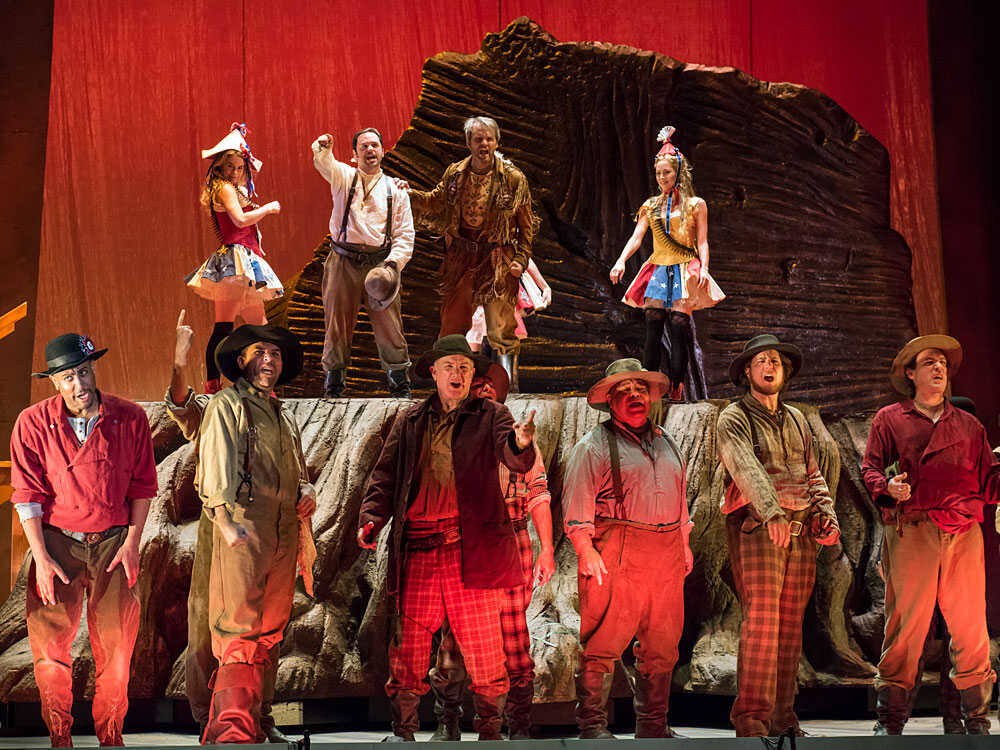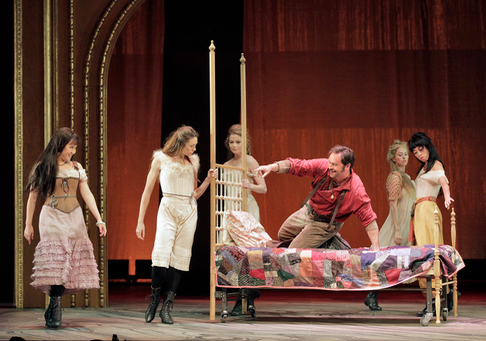
Under the baton of Grant Gershon, the SF Opera Orchestra played the score vividly and accurately, my one concern being that the War Memorial Opera House isn't the kindest of spaces to young singers whose voices are not huge, and they struggled to be heard above the orchestra in Act 1, before things warmed up. The difference is in the depth of intensity and dark beauty of the lyrical passages: Ned's soliloquy and Shirley's commentary on it, which closes Act 1, is a particularly fine example, as is the love duet between Josefa and Ramón in Act 2. The similarity is in the insistent, repetitive rhythmic drive that keeps the music propelled forwards, with the varied instrumentation of the figures above that rhythmic underpinning. The score is identifiably Adams while not especially similar to any of his others. I found the writing for male voice less distinctive, but all of Davóne Tines, Paul Appleby, Elliot Madore and Ryan McKinny showed attractive voices and the same intensity of character impersonation: Tines with the swagger of the freed slave, Appleby as the archetypal Argonaut chancer Joe Cannon, Madore as Josefa's lover Ramón, McKinny as Clarence, another narrator role but from the Anglo side. J'Nai Bridges sings the ill-fated Josefa with pride, elegance and a gloriously rich mezzo (as well as looking stunning), her dignity reminds us that the Mexicans were the established upper class of California before the “Argonauts” arrived and of the unceremonious way in which the Anglos displaced the “greasers”, as they called them, from land and power. It's a detached narrator role – overwhelmingly, she is commenting on the action, not engaged in it – but Bullock's performance is anything but detached, with lyrical beauty and purity of voice underpinning deep empathy for the people she observes.

Julia Bullock sings Dame Shirley, the author whose descriptions of the period form the basis of the opera. Lee, as the prostitute Ah Sing, produces high wire coloratura as dazzling as Fourth of July fireworks. The choice of different voice types is carefully crafted. Adams' vocal writing is tough on the singers, with myriad key changes, rhythmic shifts and difficult intervals, but these singers power through it with aplomb and show complete commitment to their varied roles. To portray those characters, they employ an exceptional cast of young singers, all American bar Korean Hye Jung Lee.

The opera is a sprawling canvas inhabited by characters of many types from many backgrounds, engaged in the rowdiness, the tawdriness, the youthful exuberance, the lewdness, the hardships and – in the end – the plain violence of those lawless days. If Adams and Sellars were visual artists, they would be Breugel.

In their latest opera, Girls of the Golden West, John Adams and Peter Sellars demand that their audience take a cold, hard look at the dark side of the founding of California as a US state. White Americans are turning on everyone else – violently forcing out blacks, Chinese and Latinos (the extermination of the native peoples would follow). We're in 1851, at the point of the California Gold Rush where the easily dug gold is beginning to run out and things are turning ugly. “The Fourth of July is yours, not mine,” sings Ned Peters, the freed black slave.


 0 kommentar(er)
0 kommentar(er)
